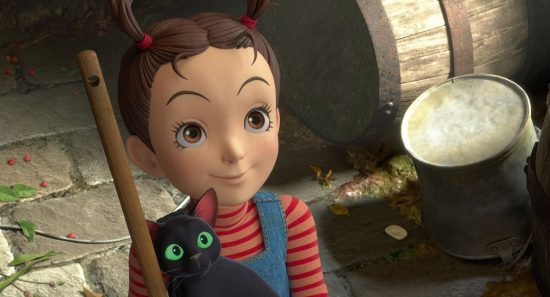Review: Earwig and the Witch
The reputation of Studio Ghibli as a company is high and is favourably compared to Disney, but with such expectations behind each new release, it was inevitable that the studio would fall. Unfortunately, it is in their first outing into CG animation that the studio has lost its footing, while not a terrible film it will feel that way by comparison to its peers.
In many ways Earwig and the Witch plays it safe, returning to the tested formula of a story of a little girl who finds herself in a magical setting in the English countryside and is based on the novel of the same name by Dianna Wynn who wrote the previous hit adaptation Howl’s Moving Castle. The story follows Earwig, a girl who was left at an orphanage and is adopted by a witch to be her assistant. Earwig differs from most protagonists by being cunning and manipulative to all the adults around her and quickly strikes a deal to work if she can learn some magic in return. Her adoptive parents are the witch Bella Yaga and the demon Mandrake. Over time Earwig uncovers clues about her adopters and her past life when she’s given a cassette tape that she had when she was left at the orphanage.
The mystery and adventure unfold over a fairly short runtime of 1 hour 20 minutes and yet there are some serious pacing issues with the film that made it feel longer than it really was. The film never builds any momentum or maintains it when it does. Directed by Gorō Miyazaki, son of acclaimed director Hayao Miyazaki, there is a lack of polish and direction to make the film pop visually. The move to CG is not a death knell to animation (see Pixar and the latest Disney films); there are some brilliant sequences that feel like classic Ghibli given three dimensions, particularly when the film gets moving rather than the interior scenes which feel drab and monotone.
The English dub cast is well-chosen (even if the voice rarely matches the mouth movements) including Richard E. Grant as Mandrake, Kacey Musgraves and Dan Stevens, and Taylor Paige Henderson as Earwig. Kacey Musgraves has a small role as Earwig’s mother at the start of the film but through the cassette tape she leaves Earwig, her singing resonates with the beautiful soundtrack which gives this film so much of its energy.
Earwig and the Witch was delayed due to Covid-19 and was released in Japan on TV in December and I can’t help but feel that this film is more suited to the small-screen on a Christmas holiday. The plot and music make it great for little children but adults will feel somewhat disappointed by the effort of Studio Ghibli, which could usually make a film that appeals to all ages.
Earwig and the Witch is out now in cinemas.










